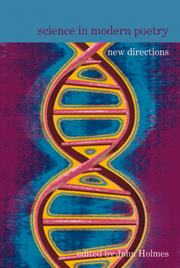Book contents
- Frontmatter
- Contents
- List of Contributors
- Acknowledgements
- Introduction
- Part I Science and Contemporary Poetry: Cross-Cultural Soundings
- 1 The Function of Antagonism: Miroslav Holub and Roald Hoffmann
- 2 Cutting and Pasting: Language Writing and Molecular Biology
- 3 The Poetics of Consilience: Edward O. Wilson and A. R. Ammons
- 4 Poetry, Science and the Contemporary University
- Part II Science in Modernist Poetry: Appropriations and Interrogations
- Part III Darwinian Dialogues: Four Modern Poets
- Afterword
- Bibliography
- Index
3 - The Poetics of Consilience: Edward O. Wilson and A. R. Ammons
from Part I - Science and Contemporary Poetry: Cross-Cultural Soundings
- Frontmatter
- Contents
- List of Contributors
- Acknowledgements
- Introduction
- Part I Science and Contemporary Poetry: Cross-Cultural Soundings
- 1 The Function of Antagonism: Miroslav Holub and Roald Hoffmann
- 2 Cutting and Pasting: Language Writing and Molecular Biology
- 3 The Poetics of Consilience: Edward O. Wilson and A. R. Ammons
- 4 Poetry, Science and the Contemporary University
- Part II Science in Modernist Poetry: Appropriations and Interrogations
- Part III Darwinian Dialogues: Four Modern Poets
- Afterword
- Bibliography
- Index
Summary
The exponential growth in knowledge during the past 100 years has been so great that it is easy to feel overwhelmed. In science, disci plines that appeared coherent two or three generations ago are divided and subdivided, and subdivided again, as researchers specialise in ever narrower yet immensely complex niches. Although reductionism in science is often viewed with suspicion in the humanities, something analogous has happened there as a result of the increased production, if not overproduction, of research. A few years ago at a conference on Victorian literature, I struck up a conversation with a fellow delegate who introduced himself as ‘a Browning man’, and sure enough there is a Journal of Browning Studies, edited from De Montfort University, Leicester. Yet Victorian literature itself would have been considered a sufficiently narrow field in the not-so-distant past.
It is as if we have erected a Tower of Babel, based on such a proliferation of knowledge that even specialists in adjacent disciplines have difficulty understanding one another. Under these conditions it would seem a futile as well as a thankless task to attempt a unified theory of knowledge, encompassing not only the sciences but also the social sciences, the humanities and the arts. Yet this is what Edward O. Wilson does in his book Consilience, subtitled The Unity of Knowledge, the central thesis of which is that ‘all tangible phenomena, from the birth of stars to the working of social institutions, are based on material processes that are ultimately reducible, however long and tortuous the sequences, to the laws of physics’ (1998, 266).
- Type
- Chapter
- Information
- Science in Modern PoetryNew Directions, pp. 55 - 66Publisher: Liverpool University PressPrint publication year: 2012



